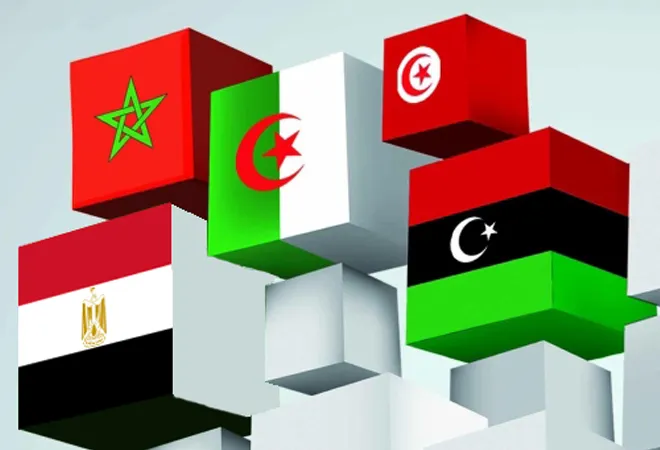
In the field of international relations, the interactions between nations often evolve over time, guided by shifting priorities and changing global landscapes. This holds true for the relationship between India and North Africa, which has undergone a remarkable transformation, surpassing ideological boundaries to adopt a more pragmatic and strategic approach, increasing India's diplomatic presence in the region. As India’s rise continues to unfold, its ties with North African countries reveals a tapestry of economic collaboration, cultural exchange, and strengthened political ties that have gone unnoticed, but highlighted the untapped potential of collaboration.
Forging strategic pathways: India's diplomatic presence in North Africa
The genesis of India's historical connection with North Africa can be traced back to the Bandung Conference in 1955, where Indian Prime Minister Jawaharlal Nehru established relationships with representatives from North African nations. During this period, India aimed to address the situation of ethnic Indian communities in North Africa and provide support for anti-colonial liberation movements.
Economic engagement took a backseat until the end of the Cold War when India extended diplomatic and financial aid through the Technical and Economic Cooperation program.
India's foreign policy approach witnessed a significant shift with its economic liberalisation in 1991. Emphasising foreign direct investment, technology transfer, and integration into the global market, India sought to expand its economic relations with North Africa, fostering a balanced approach and developing multidimensional diplomatic relationships with North African countries.
India's political relationships with Egypt, Morocco, Algeria, Tunisia, and Libya showcase its diverse approach to North Africa. India maintains a friendly and cooperative relationship with Egypt, collaborating on counterterrorism, regional stability, and trade promotion.
Morocco, with its historical ties to India, has elevated diplomatic relations to a Strategic Partnership. Algeria and India extend bilateral support in multilateral forums and share a commitment to enhancing maritime presence in the region
. Tunisia and India have enjoyed friendly ties since establishing diplomatic relations in 1958. While India's relationship with Libya has experienced fluctuations, there is potential for revitalising bilateral relations pending the restoration of political stability in Libya.
North African countries have also sought increased cooperation with India, recognising India's emergence as a global economic powerhouse and their own need to diversify international partnerships. India's approach is based on equal partnership, mutual benefits, and non-interference in internal affairs, in contrast to the prescriptive nature of Western cooperation. India's emphasis on South-South cooperation specifically promotes capacity-building, lending, win-win exports, economic growth, and a more balanced international order. Consequently, developing ties with India has become an essential foreign policy goal for North African countries.
India's flourishing economic ties in North Africa
India's economic engagement with North Africa has witnessed significant growth since 2016, with North African countries emerging as key economic partners. Given India's limited domestic energy resources, the stable and reliable supplies of vital commodities from North Africa, particularly in the energy sector, are crucial for India. Additionally, India aims to strengthen its agricultural sector and ensure food security, making North Africa an important partner in this regard.
Top 10 Indian Exports and Imports from North Africa in 2022
 Source: Indian Department for Commerce and Industry
Source: Indian Department for Commerce and Industry
India's multinational corporations and public enterprises have effectively capitalised on the North African nations' desire to diversify their economic relationships beyond conventional partners. As a result, India has significantly expanded its economic influence in the region, establishing itself as a prominent economic partner and consistently maintaining a position among the top six. Furthermore, India's presence in North Africa offers a vast consumer market for the region, considering India's projected population growth.
Egypt stands as India's primary trading partner in North Africa, fostering substantial bilateral trade worth almost $7 billion in 2022, through an established trade agreement.
Egypt is North Africa’s first major supplier of crude petroleum to India, while India reciprocates by exporting meat, iron, and steel to Egypt. Moreover, the potential for Egypt to become a natural gas hub in the Eastern Mediterranean further strengthens the prospects of a robust and enduring economic partnership between the two nations in the coming decades.
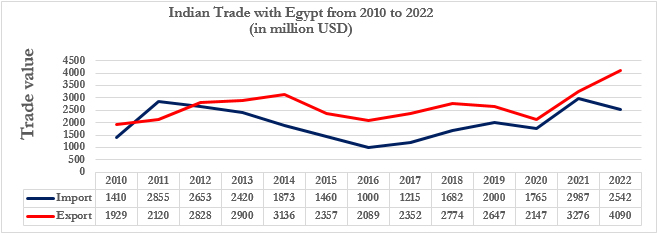 Data Sourced and Organised by the Authors from the Indian Department for Commerce and Industry and UN COMTRADE
Data Sourced and Organised by the Authors from the Indian Department for Commerce and Industry and UN COMTRADE
India's economic engagement with Morocco has steadily increased in recent years, with the
establishment of 40 Indian companies in Morocco. Bilateral trade between India and Morocco exceeded US$3.9 billion in 2022, marking a substantial increase from US$907 million in 2016. This growth has been driven by
India's imports of phosphate from Morocco, which became the first imported commodity from North Africa in 2022. India's exports to Morocco have diversified to include textiles, vehicles, pharmaceuticals, and machinery. Joint ventures and investment opportunities in diverse sectors, including renewable energy, tourism, agriculture, and the defence industry, has made Morocco a prominent partner for India's economic presence in North Africa.
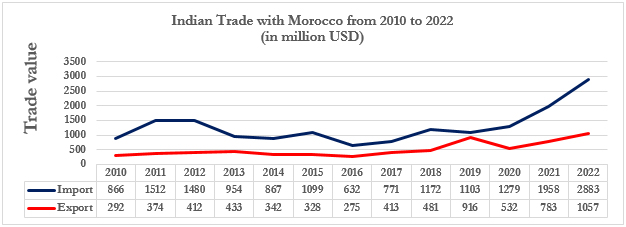 Sourced and Organised by the Authors from the Indian Department for Commerce and Industry and UN COMTRADE
Sourced and Organised by the Authors from the Indian Department for Commerce and Industry and UN COMTRADE
Bilateral trade between India and Algeria reached US$2.45 billion in 2022, with India importing US$1.1 billion of crude oil and exporting pharmaceuticals, vehicles, and food products
<1>. There has been a surge in Indian investment in Algeria, with
Indian companies including Tata,
Mahindra, and Kirloskar Brothers setting up operations in the country. These companies have established joint ventures in diverse sectors including automobiles, engineering, and energy, demonstrating India’s commitment to building a long-term partnership with Algeria.
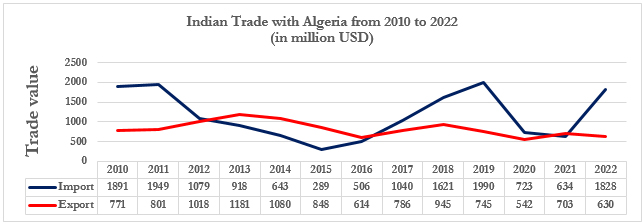 Sourced and Organised by the Authors from the Indian Department for Commerce and Industry and UN COMTRADE
Sourced and Organised by the Authors from the Indian Department for Commerce and Industry and UN COMTRADE
India's economic presence in Tunisia has been increasing at a slower pace, with bilateral trade reaching US$760 million in 2022. India imports phosphates and chemicals from Tunisia, while exporting textiles, pharmaceuticals, and engineering goods. The establishment of
the India-Tunisia Joint Commission in 2017 has provided a platform for both nations to explore new avenues for trade and investment, but the prevailing political crisis in Tunisia has contributed to an atmosphere of economic uncertainty, limiting the scope of economic cooperation, with Indian economic interest likely to remain modest in the future.
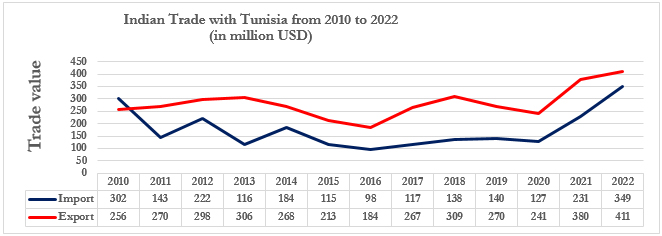 Sourced and Organised by the Authors from the Indian Department for Commerce and Industry and UN COMTRADE
Sourced and Organised by the Authors from the Indian Department for Commerce and Industry and UN COMTRADE
In Libya, India historically had a strong economic presence in the oil and gas sector, but due to the ongoing political crisis, its engagement has been limited in recent years.
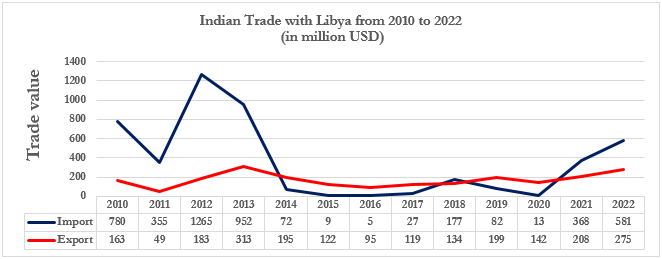 Sourced and Organised by the Authors from the Indian Department for Commerce and Industry and UN COMTRADE
Sourced and Organised by the Authors from the Indian Department for Commerce and Industry and UN COMTRADE
Perspectives
India maintains a significant presence in North Africa, although its level of influence may not be on par with other external actors. Nonetheless, India can optimise its presence in North Africa by leveraging its unique approach of South-South cooperation to forge mutually beneficial partnerships and contribute to the region's development and prosperity. To achieve this, India should focus on the following strategies:
- Strengthening trade and investment: India should prioritise trade and investment with North African countries, particularly in sectors such as infrastructure and technology transfer. By fostering robust economic ties, India can enhance its presence and engagement in the region.
- Enhancing cultural exchange: Facilitating trade fairs, promoting cultural programs, and encouraging cultural exchanges between India and North African countries will foster mutual understanding and strengthen economic and social connections. These initiatives can contribute to building trust and long-lasting relationships.
- Strengthening political and diplomatic ties: Regular high-level visits and engagements between Indian and North African leaders are crucial for building strong political and diplomatic relations. Additionally, active participation in multilateral organisations such as the African Union, the Arab League<2>, and the Indian Ocean Rim Association can provide opportunities for collaboration and cooperation on common regional and global issues.
This article is based on a longer report titled ‘North Africa’s Invisible Partner: Exploring India’s Political and Economic Influence in the Region’. Read the full report here.
Hamza Mjahed is an International Relations Specialist at the Strategic Monitoring and Analysis Unit at the Policy Center for the New South, Morocco.
Abdessalam Jaldi is an International Relations Specialist with the Policy Center for the New South, Morocco.
<1> India Ministry of Commerce and Industry.
Algeria and India Trade in 2022. Monitoring Dashboard. Department of Commerce.
<2> India holds observer status.
The views expressed above belong to the author(s). ORF research and analyses now available on Telegram! Click here to access our curated content — blogs, longforms and interviews.



 In the field of international relations, the interactions between nations often evolve over time, guided by shifting priorities and changing global landscapes. This holds true for the relationship between India and North Africa, which has undergone a remarkable transformation, surpassing ideological boundaries to adopt a more pragmatic and strategic approach, increasing India's diplomatic presence in the region. As India’s rise continues to unfold, its ties with North African countries reveals a tapestry of economic collaboration, cultural exchange, and strengthened political ties that have gone unnoticed, but highlighted the untapped potential of collaboration.
In the field of international relations, the interactions between nations often evolve over time, guided by shifting priorities and changing global landscapes. This holds true for the relationship between India and North Africa, which has undergone a remarkable transformation, surpassing ideological boundaries to adopt a more pragmatic and strategic approach, increasing India's diplomatic presence in the region. As India’s rise continues to unfold, its ties with North African countries reveals a tapestry of economic collaboration, cultural exchange, and strengthened political ties that have gone unnoticed, but highlighted the untapped potential of collaboration.






 PREV
PREV

